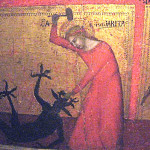We run our website the way we wished the whole internet worked: we provide high quality original content with no ads. We are funded solely by your direct support. Please consider supporting this project.

The God Who Over-Knows The Future
God perfectly knows from all time what will be, what would be, and what may be. He sovereignly sets parameters for all three categories. His knowledge of what might occur leaves him no less prepared for the future than his knowledge of determined aspects of creation. Because he is infinitely intelligent, he does not need to focus his attention on a limited set of possibilities as we do.
In other words, he is able to attend to each one of a trillion billion possibilities, as though it was the only possibility he had to consider. He is infinitely attentive to each and every one. Hence, whatever possibility ends up coming to pass, we may say that from all eternity God was preparing for just this possibility, as though it were the only possibility that could ever possibly occur.
Even when possibilities occur that are objectively improbable—and to this extent surprise or disappoint God—it is not at all the case the he is caught of guard. He is as perfectly prepared for the improbable as he is for the probable.
We humans with our limited intelligence could not as confidently attend to a trillion billion possibilities as easily, and as perfectly, as we could attend to one certainty. Indeed, our focus is divided in half the second we have to attend to two possibilities instead of one certainty. And we humans with our limited wisdom and power could not assure anyone of a certain outcome unless we exhaustively controlled all of the variables.
Hence it is tempting to project our experience upon God and assume that God must face similar difficulties. Those who criticize Open Theism often assume that God (like a finite human) can be assured of ultimate victory only if he controls all the variables. Hence, they criticize a concept of God who is not all-controlling as being out of control.
The open view of the future does not undermine God’s wisdom and sovereign control: it rather infinitely exalts it. In this view God does not know less than the classical view: he knows more. He does not under-know the future, as it were: he over-knows it.
Adapted from Satan and the Problem of Evil, pages 128-130
Image by Bs0u10e0 via Flickr.
Category: General
Tags: God's Sovereignty, Open Theism, Possibility, Providence
Topics: Free Will and the Future
Related Reading

How do you respond to Romans 8:29?
“For whom he foreknew he also predestined to be conformed to the image of his Son, in order that he might be the firstborn within a large family.” One of the greatest treasures given to believers when they open their hearts to the Lord is the promise that they shall certainly be “conformed to the…

How Could God Foreknow Peter’s Choice but not Abraham’s? (podcast)
Greg looks at the nature of God’s foreknowledge and testing. Episode 562 http://traffic.libsyn.com/askgregboyd/Episode_0562mp3.mp3

Dealing With Objections to Open Theism, Part II
There are four major objections to Open Theism. In this post, we are dealing with the third and fourth. (See yesterday’s post to read about the first two.) Objection #3: God cannot foreknow only some of the future. It is often argued that for God to be certain of anything about the future, he must be…

Warfare Worldview: A Basic Definition
The warfare worldview is based on the conviction that our world is engaged in a cosmic war between a myriad of agents, both human and angelic, that have aligned themselves with either God or Satan. We believe this worldview best reflects the response to evil depicted throughout the Bible. For example, Jesus unequivocally opposed evils…

What about the Gospel of John and Calvinism?
Question: The Gospel of John seems to teach that people believe because God draws them, rather than that God draws people because they believe. If this is true, how can you deny the Calvinistic teaching that salvation is based on God’s choice, not ours? Answer: As you note, many people find support for the view…

